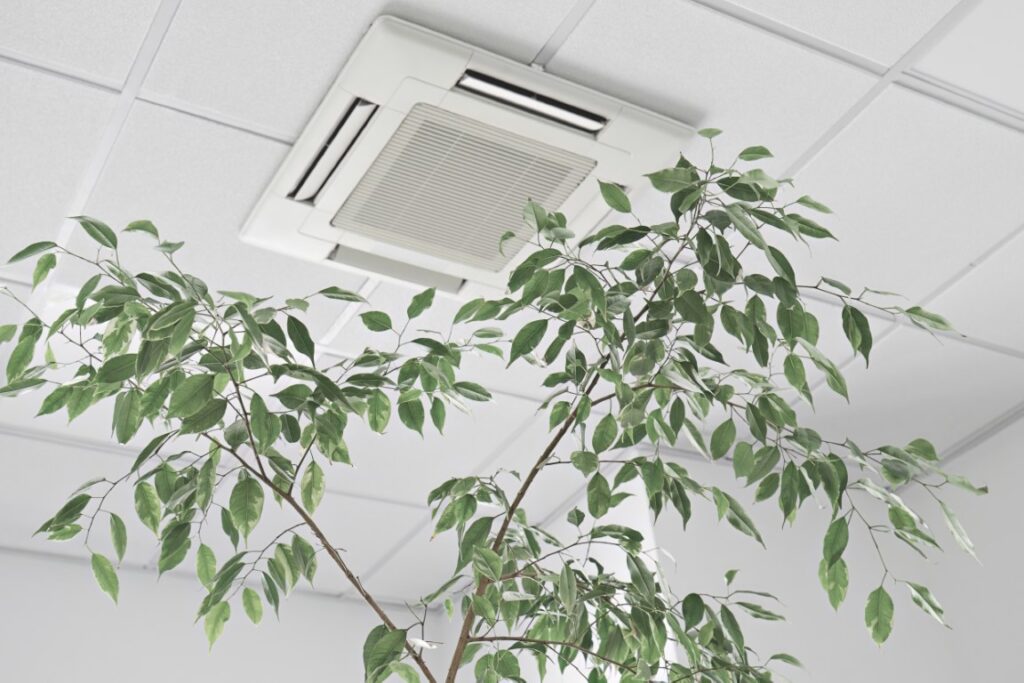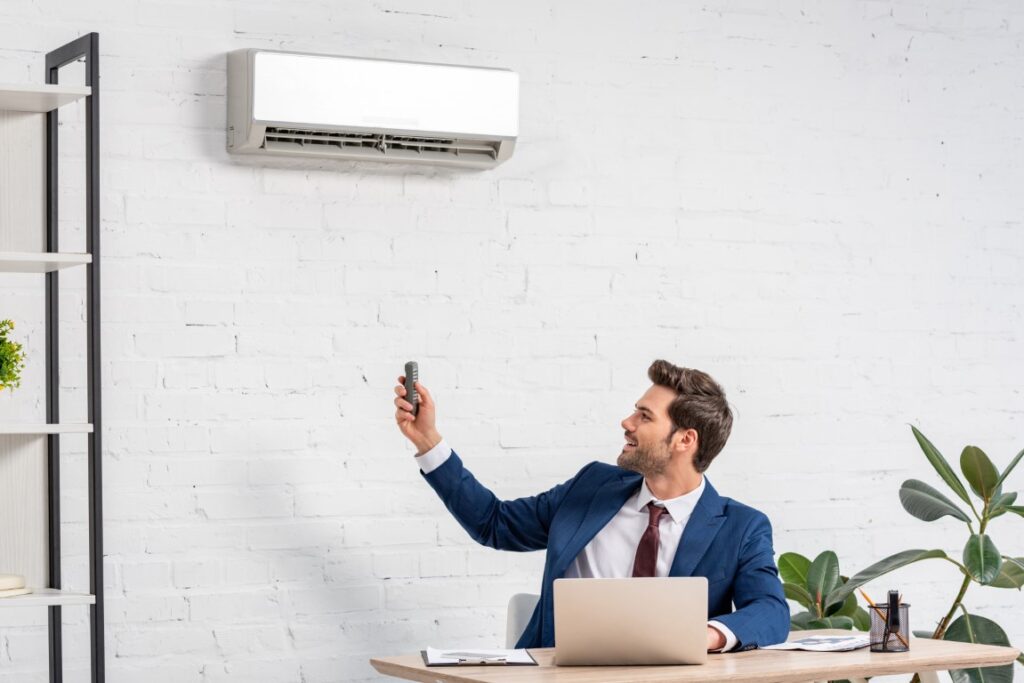A reliable and efficient commercial AC unit is essential to maintain a comfortable environment for your employees and customers, especially during the hot summer months. However, choosing the right unit can be a daunting task. That’s why we’ve compiled 6 helpful tips to assist you in making an informed decision that is right for you and your business.
1. Assess Your Cooling Needs
Before purchasing a commercial AC unit, it’s crucial to assess the cooling requirements of your business. Factors such as the size of the space, number of occupants, and heat-generating equipment should be taken into account to determine the appropriate cooling capacity for the AC unit.
Properly assessing your cooling needs ensures that the commercial AC unit you choose can effectively cool your business premises and provide optimal comfort for your employees and customers. A unit with insufficient cooling capacity can lead to discomfort, reduced productivity, and potential damage to equipment due to inadequate temperature control.
Consider the square footage of your space, taking into account any future expansion plans. Additionally, evaluate the number of people occupying the space, everyone in the space will generate body heat, determining the size of the unit you need. If your business uses heat-generating equipment, such as servers or kitchen appliances, these factors should also be considered when determining the cooling capacity required.
By accurately assessing your cooling needs, you can select a commercial AC unit that provides adequate cooling performance and enhances the overall environment of your business.
2. Consider Energy Efficiency Ratings
When selecting a commercial AC unit, energy efficiency should be a top priority. By choosing units with high Seasonal Energy Efficiency Ratio (SEER) ratings, you can ensure better energy performance and lower operating costs for your business. Additionally, opting for energy-efficient models contributes to reducing your carbon footprint and promoting sustainability.
With higher SEER ratings, commercial AC units can provide efficient cooling while consuming less energy. This translates into cost savings for your business in the long run. Investing in energy-efficient technology benefits your bottom line and aligns with your environmental responsibilities, making it a win-win situation.
Consider the table below, which highlights the relationship between SEER ratings and energy efficiency:
| SEER Rating | Energy Efficiency |
| 10-12 | Standard Efficiency |
| 13-16 | Moderate Efficiency |
| 17-20 | High Efficiency |
| 21+ | Ultra-High Efficiency |
Please note that SEER ratings may vary depending on the specific model and brand of the commercial AC unit. It is advisable to consult with a professional HVAC technician to determine the optimal SEER rating based on your business’s cooling needs and budget.

3. Evaluate Lifespan and Maintenance Requirements
When choosing a commercial AC unit, it’s important to consider not only the upfront costs but also the long-term maintenance requirements. Opting for a unit with a longer average lifespan can save you money in the long run as you won’t have to replace it as frequently. Additionally, selecting a unit that requires minimal maintenance can help reduce ongoing expenses.
Regular maintenance and cleaning are crucial for ensuring the optimal performance and longevity of your commercial AC unit. By following the manufacturer’s recommended maintenance schedule and keeping the unit clean, you can prevent potential issues and extend its lifespan.
It’s also worth considering the availability of maintenance services in your area. Look for reputable HVAC companies that offer comprehensive maintenance packages and reliable support. Having access to professional technicians who can provide regular check-ups and address any issues quickly will ensure that your AC unit remains in top condition.
4. Determine Installation and Space Constraints
When choosing a commercial AC unit for your business, it’s essential to evaluate the availability of space and installation requirements in your business. An efficient installation process is crucial to ensure optimal functionality and performance of the AC unit.
Consider the following factors when determining the installation and space constraints:
- Ductwork Availability
Some commercial AC units require ductwork for proper airflow and effective cooling. Assess whether your business space already has ductwork in place or if it needs to be installed. The presence or absence of ductwork will help determine the type of AC unit suitable for your space.
- Outdoor Unit Space
Outdoor AC units require adequate space for placement. Evaluate the available outdoor space in your business premises to ensure it can accommodate the chosen unit. It’s important to consider factors such as clearance requirements and proximity to neighbouring structures.
- Electrical Requirements
Commercial AC units have specific electrical requirements to operate effectively. Determine whether your business premises can meet these electrical requirements, including voltage and amperage, to ensure a seamless installation process.
By carefully assessing the installation and space constraints, you can select a commercial AC unit that aligns with your business’s specific needs and provides optimal cooling capabilities.
| Installation Factors | Considerations |
| Ductwork Availability | Assess if existing ductwork is available or if it needs to be installed. |
| Outdoor Unit Space | Evaluate the available outdoor space and clearance requirements. |
| Electrical Requirements | Determine if the electrical system can meet the AC unit’s specific requirements. |
5. Consider Additional Features and Customization Options
When choosing a commercial AC unit for your Canadian business, it’s essential to consider the additional features and customization options available. These features can enhance the functionality and efficiency of your AC system, providing a tailored cooling solution that meets your specific needs.
- Smart Thermostats
One of the additional features to look for is a smart thermostat. Smart thermostats offer advanced control capabilities, allowing you to set precise temperature schedules and monitor energy usage. With remote access through a smartphone app, you can adjust the settings from anywhere, ensuring optimal comfort and energy efficiency.
- Zoning Capabilities
Another valuable customization option is the ability to create zoning within your commercial space. Zoning capabilities allow you to divide your business premises into different areas with independent temperature controls. This feature is especially useful for buildings with varying cooling needs or multiple occupancy levels, optimizing comfort and energy usage.
- Air Purification Systems
Consider an AC unit that incorporates air purification systems to improve indoor air quality. These systems eliminate pollutants, allergens, and odours from the air, creating a healthier and more comfortable working environment. Look for features such as HEPA filters or UV sterilization technology, which efficiently remove impurities and ensure clean, fresh air circulation.
- Humidity Control
For businesses located in areas with high humidity levels, an AC unit with humidity control can be beneficial. These units have sensors that detect and adjust the indoor humidity, maintaining a comfortable and moisture-free environment. Controlling humidity not only enhances occupant comfort but also helps prevent issues like mold and moisture damage.
Additional Features and Customization Options Comparison Table
| Feature | Description | Benefits |
| Smart Thermostats | Advanced control capabilities with remote access | Energy efficiency, precise temperature control |
| Zoning Capabilities | Divide space into different areas with independent temperature controls | Customized comfort, optimized energy usage |
| Air Purification Systems | Eliminate pollutants and allergens from the air | Improved indoor air quality, healthier environment |
| Humidity Control | Adjust indoor humidity levels | Prevention of mold growth, moisture damage, enhanced comfort |
By evaluating these additional features and customization options, you can select a commercial AC unit that not only provides efficient cooling but also enhances comfort and indoor air quality in your Canadian business. Tailoring your AC system to meet your specific requirements ensures a pleasant working environment for employees and customers.

6. Examine Warranty and Support Services
When investing in a commercial AC unit, it’s essential to carefully assess the warranty and support services offered by the manufacturer. A comprehensive warranty provides you with peace of mind, ensuring that you are protected against potential defects or repairs that may arise during the initial period of use. It is crucial to understand the specific terms and conditions of the warranty, including the duration, coverage, and any limitations.
Dig deeper into the warranty details to determine if it covers both parts and labor costs. Some manufacturers offer extended warranties for an additional cost, which can provide extended coverage beyond the standard warranty period. Assessing the warranty can help you gauge the level of confidence the manufacturer has in their product’s quality and performance.
In addition to the warranty, it’s equally important to research the availability and quality of support services provided by the manufacturer or authorized service providers in your area. Prompt and reliable support services can significantly impact the efficiency and longevity of your commercial AC unit.
Look for manufacturers or service providers that offer timely and professional assistance, ensuring that any potential issues can be swiftly addressed. Consider reading customer reviews and testimonials to get insights into the experiences of other businesses that have utilized their warranty and support services.
Benefits of Examining Warranty and Support Services
By thoroughly examining the warranty and support services associated with your chosen commercial AC unit, you can enjoy the following benefits:
- Peace of mind knowing that potential defects or repairs will be covered during the warranty period.
- Protection against unexpected expenses for repairs or replacements.
- Access to prompt and reliable support services, minimizing downtime and disruptions to your business operations.
- Assurance that you will receive professional assistance from authorized and experienced service providers.
- Improved efficiency and longevity of your AC unit through regular maintenance and support.
Comparison of Warranty and Support Services
When evaluating different commercial AC units, it can be helpful to compare the warranty and support services offered by various manufacturers. Below is a comparative table highlighting key aspects of the warranty and support services.
By following these five essential tips, you are now equipped with the knowledge to choose the perfect commercial AC unit for your Canadian business. By carefully considering your cooling needs, energy efficiency, maintenance requirements, installation constraints, additional features, warranty, and support services, you can ensure optimal comfort and cost-efficiency in your commercial space.
Remember to assess the cooling requirements of your business based on the size of the space, number of occupants, and heat-generating equipment. Look for AC units with high SEER ratings to improve energy performance and lower operating costs. Evaluate the lifespan and maintenance requirements of the unit, as well as any space constraints for installation.
Also, consider any additional features and customization options that align with your business’s specific needs. Remember to check the warranty details and availability of support services offered by the manufacturer or authorized service providers in your area. Taking all these factors into account will help you select a commercial AC unit that provides optimal comfort while being cost-efficient and environmentally friendly.
Investing in the right commercial AC unit will ensure a pleasant and productive environment for your staff and customers. So stay cool, make an informed decision, and enjoy the benefits of a well-selected commercial AC unit in your Canadian business.
Contact Us
Incorporating commercial AC units into your HVAC service is crucial for maintaining comfortable indoor temperatures and ensuring a productive work environment in Canada. With efficient cooling and heating capabilities, commercial AC units play a vital role in creating a comfortable and conducive space for businesses and employees.
To optimize the benefits of commercial AC units, it is essential to seek professional HVAC service. Here at North Wind, we pride ourselves on our high-quality products, seamless installation services, and impeccable customer service. Don’t compromise on the comfort and productivity of your commercial space. Contact us today and invest in a reliable commercial AC unit for a comfortable and efficient tomorrow.
FAQs
How often should I schedule maintenance for my commercial AC unit?
It’s recommended to schedule maintenance for your commercial AC unit at least twice a year, ideally before the start of the cooling and heating seasons. Regular maintenance helps ensure optimal performance, energy efficiency, and longevity of your system.
What size commercial AC unit do I need for my business space?
The size of the commercial AC unit you need depends on factors like the square footage of your business space, insulation levels, ceiling height, number of occupants, and heat-generating equipment. It’s best to consult with an HVAC professional to perform a load calculation and recommend the appropriate size unit for your specific needs.
How can I improve the energy efficiency of my commercial AC unit?
Several steps can improve the energy efficiency of your commercial AC unit, such as regular maintenance, including cleaning or replacing air filters, sealing ductwork, upgrading to a programmable thermostat, using energy-efficient HVAC equipment, optimizing airflow, and implementing temperature setbacks during non-business hours. An HVAC professional can also conduct an energy audit to identify additional efficiency opportunities.
